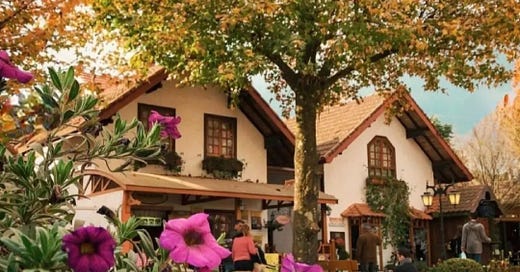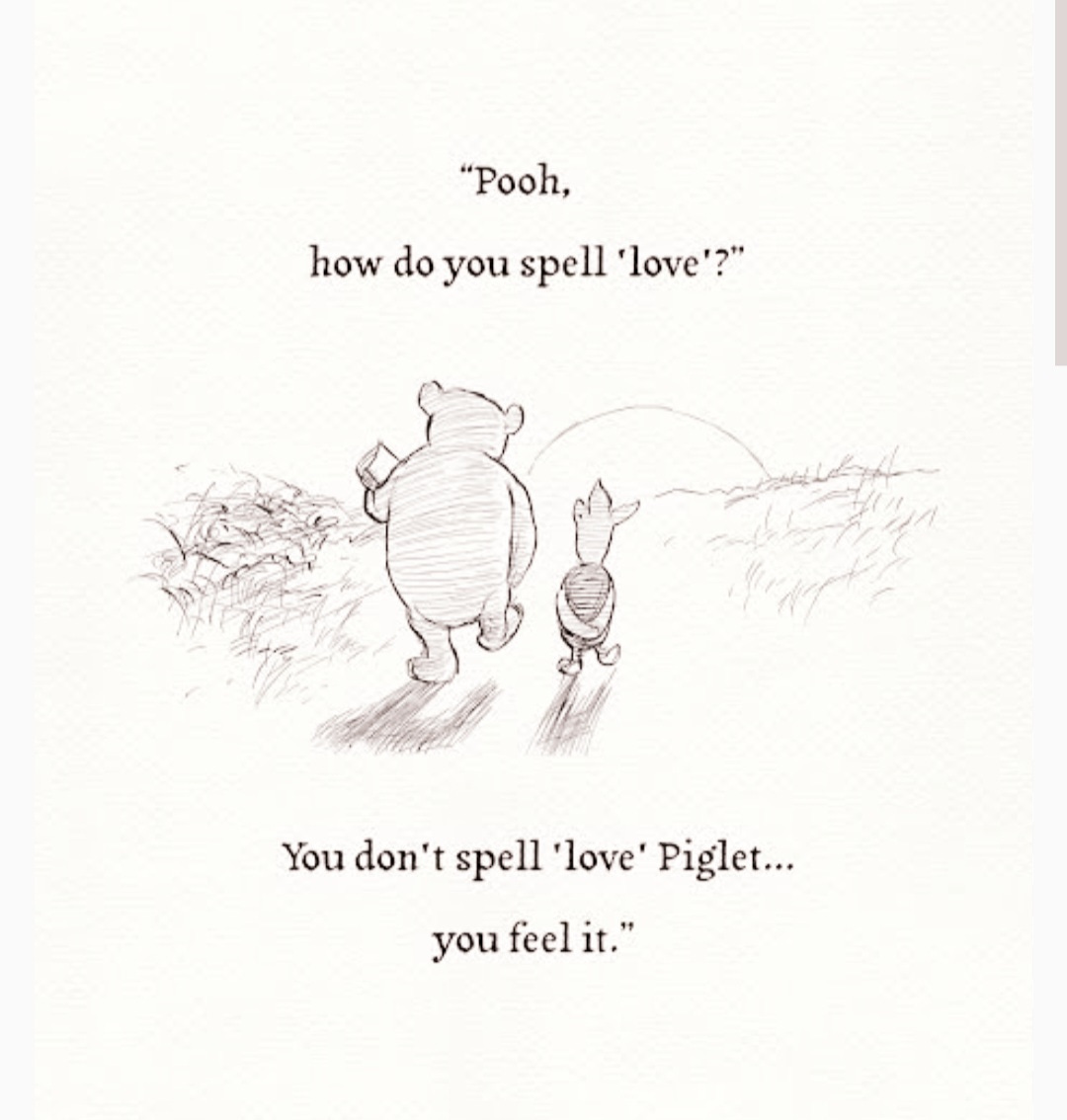“Most of us were taught that God would love us if and when we change. In fact, God loves you so that you can change. What empowers change, what makes you desirous of change, is the experience of love. It is that inherent experience of love that becomes the engine of change.”
— Richard Rohr
Tiny buds whisper promises, while big blossoms sing of fulfillment.
I have loved writing with my whole heart for as long as I can remember. It is both an anchor and a reckoning, a way of pressing my palms against the ephemeral and feeling, if only for a moment, that I might hold it. I write to capture what slips through—the ache of time moving, the quiet way change settles into the corners of our days, unnoticed until it has already remade us.
Lately, though, I’ve found myself unable to hold much of anything. There’s been a weight pressing down on me—my chronic migraines, a sadness I can’t quite name. Some days, my thoughts drift too far from language, and the words feel just out of reach, like trying to grasp mist before it dissolves. I sit in conversations and feel distant, as though I’m listening through water, the voices softened, blurred. It’s a strange thing—to be both here and not, present and slipping away all at once.
The shifting of seasons has only made this solitude more pronounced. There’s a certain nostalgia woven into these shorter days, an unspoken reminder of time’s passage. The air turns crisp, carrying whispers of change through the trees. The golden light lingers for just a breath longer before surrendering to dusk, and the scent of rain-kissed earth drifts through the cool mornings.
I find comfort in the warmth of a sweater, in the way autumn wraps itself around you like an old friend, urging you to slow down, to listen, to witness the quiet marvel of transformation. Thoughts turn—sometimes sharp, sometimes soft, often strange—seeking form in language, in poem, in story. Softening resistance into surrender, allowing fear to dissolve into trust—a gentle space to realign and rediscover.
Autumn has arrived on my side of the world—a time for slowing down, sipping warm drinks, and embracing deep thoughts. The trees let go of their leaves with ease, reminding us that release is part of growth.
Nearly three years ago, I named my newsletter The Good, The Fight, The Light before I even knew what Substack was. The words came to me one afternoon while writing, and later, in the middle of the night, they returned—unyielding and insistent, as if they had always existed, waiting for me to claim them.
At first, I thought it was simply a title, a way to mark a personal journey. But over time, it became something more. If you’ve ever tried to translate a flood of emotions into words—especially in a language not your own—you know how impossible it can feel. We evolve, we outgrow meanings, we rewrite the stories we once believed to be permanent. And yet, I still remember the weight of that first moment—the ache of reaching for something that mattered, the quiet thrill of knowing I might never fully grasp it but trying anyway.
Back then, my English wasn’t what it is now. I worried that my words might be misread, that they would be too raw, too deep, too much. Maybe they were. Maybe they still are. But I have learned that words, like stars, burn with their own fire, even when they seem distant and unrecognizable to others. And perhaps that’s the point—to write not to be understood perfectly, but to be felt. To trust that somewhere, someone will read and think, Yes. This is real. This is true.
Until two years ago, I wasn’t on social media at all. When I finally joined Instagram and started engaging more on Substack, I quickly realized the delicate balance between connection and overwhelm. There’s so much information at once, so many voices competing for attention. I’ve never been one to scroll endlessly—it unsettles me, fragments my focus. There is too much noise. The world moves so fast, and I am slow. I crave slowness. I need it.
A sense of clarity arises when we step back, allowing silence to settle. Writing, for me, is an attempt to capture those fleeting truths that emerge in stillness. It’s a way of naming what aches, of holding a moment before it dissolves into memory. And when I learn that my words have found their way into someone else’s story—that they have, in some small way, echoed within another heart—it reminds me why I keep writing. Why I must.
Change arrives both suddenly and quietly. Sometimes it crashes into us like a storm; other times, it unfolds so gently that we don’t realize we’ve been remade until we look back and see that the person we were is no longer the person we are. Growth happens not just in movement, but in the pause, the waiting, and the steady faith that something extraordinary is on its way.
Time moves without asking permission. It slips through our fingers—weightless yet heavy, impossible to hold yet leaving traces on everything it touches. We chase it, try to stretch it, try to save it. But maybe the secret isn’t in capturing time—it’s in surrendering to it. In understanding that time does not simply pass; it lives within us, shaping who we are, moment by moment, breath by breath.
A few days ago, I wandered into a small flower shop. I’m not sure why—perhaps I was seeking something unnamed, something quiet and alive.
Being born in spring, I feel that flowers have a way of reenergizing my heart. I’ve always loved their symbolism—the way they carry meaning beyond words, the way they bloom without hesitation, the way they turn toward the light. Above all, there is a certain kind of wisdom in them—a silent, unassuming knowledge that speaks not in words but in the way they grow. They do not question whether they are worthy of blooming. They do not rush the process, nor do they resist the inevitable cycle of budding, flourishing, fading, and returning to the earth.
I recently read about hellebores—how they bloom in winter, defying the cold, carrying within them a quiet resilience. They are symbols of enduring love, of hope that persists even in the harshest seasons. Standing there, surrounded by petals and fragrance, I thought about how love, too, takes on different forms. Sometimes, it is bright and certain, like a summer field in full bloom. Other times, it is subtle and unwavering, like a hellebore in the dead of winter, refusing to wither.
Not all transformations arrive with a grand return. Most of the time, there are no sweeping redemption arcs, no single defining moment when we wake up and realize we have changed. There is only the slow rhythm of days turning into months, then into years. Change does not announce itself; it happens in fragments, in the spaces between moments, in the breaths we do not notice.
And yet, there is something sacred in these slow, unhurried days—the ones where time loosens its grip and the world feels softer, quieter. Without the usual rush, small details come into focus: the way sunlight filters through the curtains, the rhythm of your own heartbeat, the way a cup of coffee warms your hands just right. These moments stretch, wander, and settle into corners often ignored. And maybe that’s why they matter—because they remind us that life isn’t always about movement. Sometimes, it is simply about presence.
When we take the time to truly see someone—to glimpse the quiet intricacies of their inner world, their hopes and fears, the weight they carry—we begin to understand that love, at its core, is a kind of seeing. And once we have seen, truly seen, it becomes impossible to turn away.
In this touching moment from the Hundred Acre Wood, Piglet innocently asks about the meaning of love. This tender exchange beautifully conveys the idea that love is beyond words—it’s something that lives in the heart.
But this kind of awareness asks something of us. It asks us to slow down, to move beyond our own distractions and assumptions. It asks us to look more closely, to recognize that every person we meet carries a story as vast and tender as our own. And in that understanding, something shifts. Kindness stops being a choice and becomes something instinctive, something inevitable.
Some acts of love stay with us for a lifetime, unfolding their wisdom over and over again. Perhaps this is what it means to be both temporary and endless—to exist in the fleeting, the impermanent, and still leave something behind. A trace of warmth, a whisper of light. A reminder that even in the quietest moments, even in the spaces where time feels still, something is always growing.
Perhaps that is why flowers have always felt like reminders—of resilience, of impermanence, of beauty that does not demand attention yet still softens the world. A wildflower growing through a crack in the pavement carries the same quiet perseverance as a rose tended with careful hands. A field of daisies swaying in the wind moves with the same grace as a single lily standing alone in the shade.
We, too, are like flowers. We bloom in seasons—sometimes in expected ways, other times when no one is watching. We endure storms, grow toward the warmth of humility, and wilt when we are neglected. But even in our most fragile states, we hold within us the possibility of renewal.
There’s a deep contentment in understanding that flowers do not fight to stay in bloom forever. They open when the time is right, share their beauty without reluctance, and then let go, trusting that life will begin again. And maybe, within their steady confidence, they are teaching us to do the same.









This is absolutely, crushingly beautiful and honest and accurate. Thank you for sharing your raw experience and putting it into such beautiful words. 🌸🤍 Wishing you relief from pain and and complete healing- of body and soul.
Beautiful Thaissa. Such radiant, refreshing, necessary reflections in a culture that packages everything (even slowness, mindfulness, surrender) as catalysts for self-improvement. Trusting the pause, the stillness, and letting the cycles of our lives move at their own pace is a radical, nurturing act. And like you say, opens us to an entirely new way of seeing, of loving. 🙏